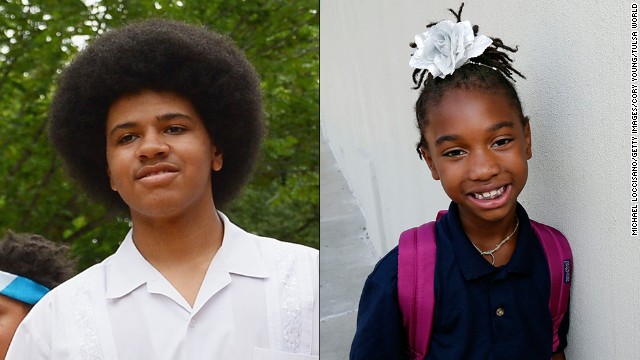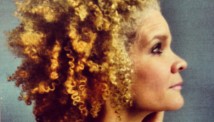- Back to Home »
- A tale of two black hairstyles

- Michaela Davis: Two very different children found their hair in the spotlight this past week
- Davis: While Dante de Blasio's afro won hearts, Tiana Parker's dreadlocks got criticized
- She says the "otherness" of black hair is a reminder that there is still bias to overcome
- Davis: Let's hope one day black hairstyles won't trigger powerful emotions or suspicions
Editor's note: Michaela Angela Davis, a writer and activist, was the executive fashion, beauty and culture editor at Essence, editor in chief of Honey and fashion director at Vibe magazines.
(CNN) -- Hair in the black community is like a religion, resplendent with ritual, devotion, mythology, metaphor, plenty of pomp and circumstance.
Black hair arguably is one of the quickest indicators of ethnicity, ethos and sometimes, politics. This past week, two very different children found their very different "ethnic" hairstyles in the spotlight on two very different political stages.
Dante de Blasio, the son of New York City mayoral candidate Bill de Blasio, is a typical nerdy, smart, shy 16-year-old Brooklyn boy. He has delighted New Yorkers, late-night satirists and America with his charm and awesome afro.

When the Big Apple's primary election was held, it garnered national attention at first largely because of the high-profile and high-drama candidate Anthony Weiner. Yet, when it came to the TV campaign ads, liberal Bill de Blasio stole the show.
But it's mostly not because of his anti-Bloomberg or I'm-for-the-small-man messages (although that matters). It was because of his son Dante, who starred in a brilliant 30-second straight no chaser ad. Displaying a fluffy 'fro, he became a symbol for progress, acceptance, diversity and freedom.
Dante and his gravity-defying, nonconformist hairstyle helped signal to New Yorkers that his father, Bill de Blasio, understands equality, empathizes with the victims of systemic bigotry and is more than qualified to lead the most diverse metropolis in America. De Blasio finished first in the primary, though it is not clear whether he will have to face a runoff against Bill Thompson for the Democratic nomination.
To some black voters, Dante's afro reflected that this boy and by association his father, respected the civil rights struggle, since the afro is considered an icon for black pride and progress. In other words -- you can trust de Blasio to be sensitive to issues of race that affect New York City, most notably the controversial stop-and-frisk policy. And to white voters and others, Dante's afro was just cool.
But while Dante's afro is being celebrated, in a different part of America last week a little girl in Tulsa, Oklahoma, was reprimanded because her hairstyle violated the policy of her charter school.
Tiana Parker, a pretty, sweet, shy 7-year-old Midwest girl with a big bow over her dreadlocks was criticized because at the Deborah Brown Community School where she is a student, "hairstyles such as dreadlocks, afros, Mohawks and other faddish styles" were not permitted.
When the tearful Tiana hit the TV news cycle, many people were heartbroken watching her. According to news reports, she was told that her perfectly neat little locks "didn't look presentable."
This is certainly not the first time that dreadlocks have been banned from schools but it was one of the most emotional instances.
So much so that more than 20,000 people signed a petition demanding that Deborah Brown Community School publicly apologizes to Tiana Parker and her family. Parker's parents pulled her out of the charter school and placed her in a new school where hopefully she can lead a hair hassle-free childhood. (Deborah Brown Community School has since apologized and removed the language about African-American hairstyles from its dress code.)
Tiana's experience, for many, is a symbol that ignorance and bias still pervades American life. The fact that in her natural state, her hair was viewed as rebellious, signals that there is a lot of misperception that we must correct. One way to fix this is for mainstream media to champion more diverse images of black beauty.
Black hair is a repository for America's painful past and promising future. The endless style possibilities of black hair represent America's creative genius, yet its "otherness" is a constant reminder of unresolved inequalities and subtle prejudices.
Let's hope that one day, hairstyles from the black community will no longer trigger powerful emotions or suspicions.
Follow @CNNOpinion on Twitter.
Join us at Facebook/CNNOpinion.
The opinions expressed in this commentary are solely those of Michaela Angela Davis.







